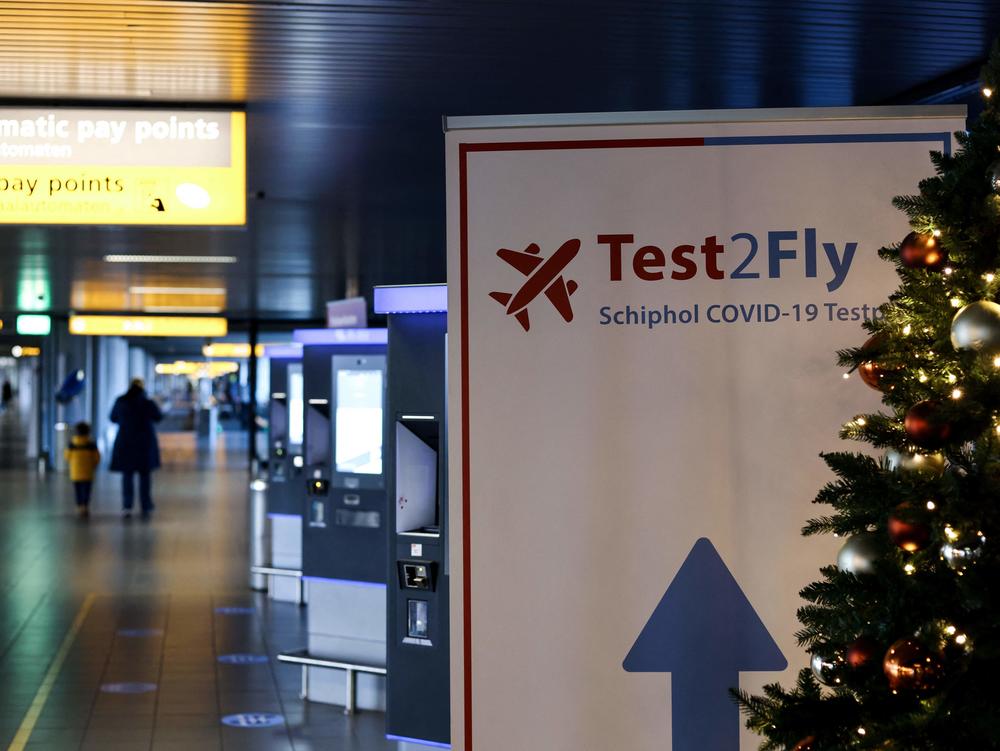Section Branding
Header Content
The omicron variant was in Europe a week before South Africa reported it
Primary Content
The omicron coronavirus variant was already in the Netherlands a week before South Africa reported the new variant to the World Health Organization, according to a Dutch health agency.
The variant was recently identified in retests of samples that were taken on Nov. 19 and 23, the National Institute for Public Health and the Environment, or RIVM, announced on Tuesday.
Revelations about the variant's existence in Europe before it was reported in Africa add a new twist to questions about where and how the variant originated — and whether travel bans on South Africa and its neighbors are an appropriate response to the variant.
South African President Cyril Ramaphosa says his country is being punished for detecting the variant and informing global health authorities about it.
"You do not try and contain a virus through imposing bans unscientifically and indiscriminately," Ramaphosa said on Tuesday, adding that measures such as testing all travelers are the best tools for combating the pandemic.
South African officials raised the alarm about the heavily mutated variant, B.1.1.529, on Nov. 24. Two days later, the WHO classified it as a variant of concern and dubbed it omicron.
The global health agency says the variant poses a "very high" risk because its mutations could help it spread more easily — and possibly infect people who might otherwise be considered immune to previous variants.
Abnormalities prompted retest of old samples; links to southern Africa are unclear
The Netherlands had previously reported more than a dozen omicron COVID-19 cases, detected in tests at an Amsterdam airport on Nov. 26, when 624 people arrived in the country from South Africa.
Dutch authorities scrutinized the older samples after initial PCR tests found abnormalities in the coronavirus' spike protein — the omicron variant has 26 to 32 mutations in that area alone, according to the WHO.
The samples were taken at a municipal public health service test site, the RIVM said, adding, "It is not yet clear whether these people had also visited southern Africa."
Rapid spread of omicron has triggered travel restrictions
As of late Monday, 33 omicron cases had been confirmed in Europe, in eight countries: the Netherlands, Austria, Belgium, Czechia, Denmark, Germany, Italy and Portugal, according to the European Centre for Disease Prevention and Control. It's also been found in other places, from Hong Kong to Israel.
The omicron variant triggered a rush of new travel restrictions targeting South Africa and other southern African nations. Almost immediately, new bans were announced or proposed by the EU, the U.S. and Canada, along with Japan, Russia and the U.K.
Ramaphosa is insisting such bans be lifted, stating, "This is unfair, this is discriminatory against us."
Health experts have long questioned the efficacy of such bans — and in the case of the coronavirus, many believe the omicron variant has already spread too rapidly to be contained in a single part of the world.
Where omicron originally emerged is still unknown
Days after South Africa informed the WHO about the new variant, Botswana said its genomic surveillance of COVID-19 had found four omicron cases, in foreign diplomats who entered the country on Nov. 7.
"It's not clear where the variant actually emerged," as the STAT health news site reports. "It could be that South Africa and Botswana saw it early because they have strong genetic sequencing networks."
The four people tested positive on Nov. 11, as they prepared to leave Botswana; their samples were retested after the alarm was raised about the variant.
Botswana has not identified the diplomats or said where else they traveled. The country recently said it found an additional 15 cases, with the majority of them also linked to international travel.
Copyright 2021 NPR. To see more, visit https://www.npr.org.

